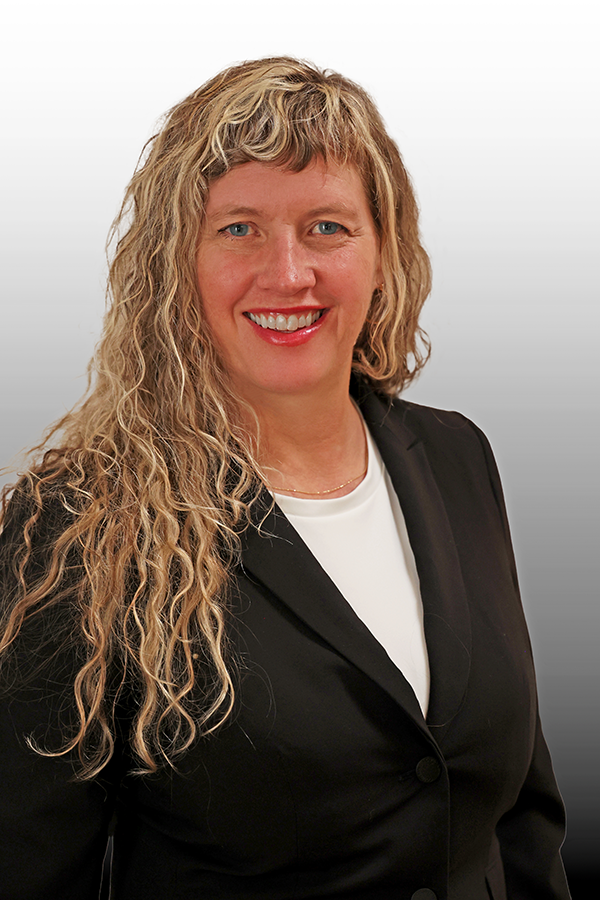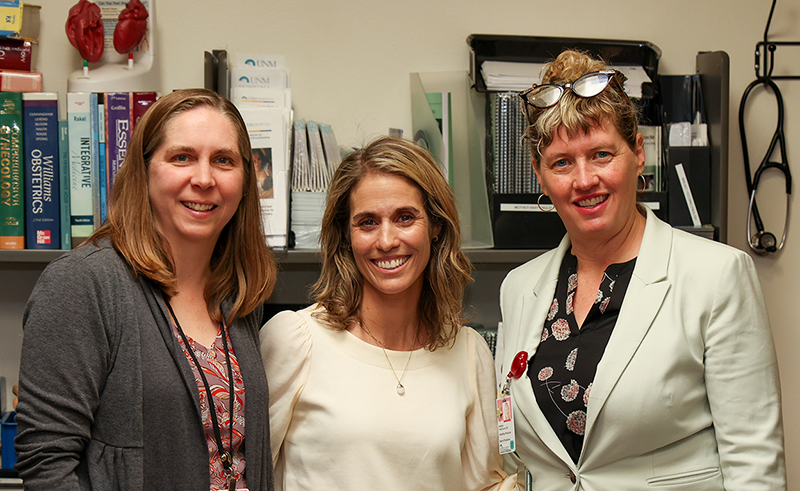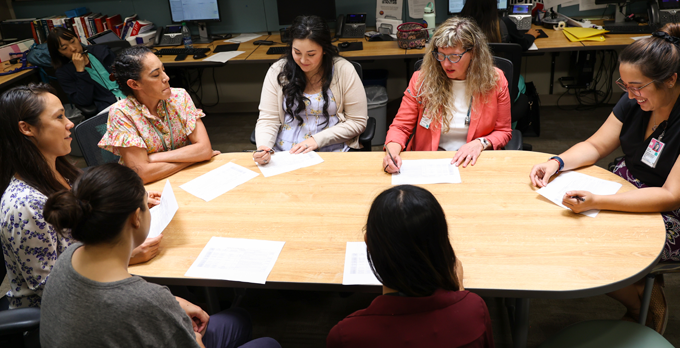New congressional funds allocated to a program aimed at helping families manage complex health issues during an infant’s earliest stages of life is expected to allow more New Mexico families to overcome the hurdles that prohibit such access to care.
Welcoming a new life into the world comes with plenty of unknowns – what kind of care will they need? Will they be healthy? Who will they grow up to be?
Through the FOCUS Program at The University of New Mexico, an interdisciplinary team aims to support families in need of specialized care as they embark on answering these questions. The FOCUS Program includes a fully integrated multidisciplinary primary care clinic offering behavioral health and developmental services, as well as an Early Intervention Program that provides home-based services and support.
Pratt-Chavez co-leads the FOCUS Program with fellow directors Kate McCalmont, MD, UNM School of Medicine faculty and family medicine physician who provides primary care and substance use disorder treatment in the outpatient setting, and Peggy MacLean, PhD, who heads the behavioral health and developmental team through the UNM Center for Development and Disability.

It's some of the most satisfying work that I've been able to do, because it's just such an important opportunity to collaborate with families, and it is an honor to take care of these little people.
Together, this triad worked with Sen. Martin Heinrich to secure $2 million in congressionally directed funding, specifically to increase services and access for children and families through the FOCUS program.
“Sen. Heinrich pushed through the funding and his team really advocated for this program,” said Pratt-Chavez. “It’s a testament to the work that we all are doing at UNM and how important it is.”
MacLean commented, “I feel privileged working with an interdisciplinary team that tries to understand the needs of families with young children. This funding allows our program to respond to the needs our families face and provide resources that can ultimately support them in their parenting role.”
The funding will come from the Federal Administration for Children and Families and used to increase capacity of the medical clinics to provide more access for patients. In line with the program’s practice of listening to families about their most significant needs, part of the funding will be used to address transportation challenges. Some possible solutions include increasing collaboration with existing Medicaid Transport Services and developing a partnership with Uber Health.
“We'll be on the phone with a mom and her little baby is in the car seat. She’ll let us know, ‘I really want to be there [at the clinic], but I can't get there, my car won't start.’ Or ‘my ride didn't show up’ and that little baby may not get to an important appointment. We need to see them. We want to help our families get to us,” said Pratt-Chavez.
The FOCUS Program has evolved and expanded over the past 30 years to be a cross-departmental partner that provides a more extensive offering of support services for families. Additional uses for the congressionally directed funding include increasing the number of social workers in the program and potentially hiring a nurse to do home visits for families.
Childcare is a significant challenge, so the FOCUS program is in the early stages of developing collaborations with local childcare centers. The new influx of funding will also help support program evaluation and dissemination. The directors plan to develop a symposium to support other providers in learning about what the FOCUS program offers, and advance understanding about the most effective approaches to engage families with substance use disorders and complex trauma.
The FOCUS team also strives to provide culturally responsive care to all families. To that end, Pratt-Chavez and her colleagues are working toward exploring and implementing approaches attuned to the unique contextual and cultural needs of families in New Mexico. These efforts include plans to further develop collaborative relationships with community leaders, providers, and families from diverse communities in Albuquerque. FOCUS is looking at models of care that provide access to Spanish-speaking/bilingual providers and cultural brokers. Efforts also include adapting training models to support FOCUS medical and psychology trainees in developing reflective capacity to work with diverse populations with complex psychosocial needs.
The final piece of the puzzle is sustainability because whatever programs and services are developed with the federal funding, the team wants to ensure they’re able to keep all of those offerings up and running. The FOCUS Program continues to develop partnerships across UNM Health Sciences and the state to support this model of intensive, interdisciplinary care.
McCalmont noted, “this funding is exciting in that it will allow us to create capacity for program evaluation. We hope to generate evidence for the effectiveness of the FOCUS model and demonstrate the impact that engagement with FOCUS can have on the health and stability of families.”
For Pratt-Chavez, the journey of doing this work continues to be among the most fulfilling of her career.
“It's some of the most satisfying work that I've been able to do, because it's just such an important opportunity to collaborate with families, and it is an honor to take care of these little people,” said Pratt-Chavez. “FOCUS allows families to access services that promote their own recovery and the health of their family, so we can really prevent ongoing trauma for children and help parents be great at their jobs as parents.”

The FOCUS program specializes in serving diverse families with social complexities, trauma, and/or substance use disorder. The medical clinic provides primary care for parents and caregivers, treatment of substance use disorders, mental health treatment, counseling, and social work services to support parenting and recovery. The program often helps families to address unstable housing, access to food, and lack of transportation.
The FOCUS Early Intervention program pairs families with an early intervention team, including developmental specialists, occupational therapists, speech therapists, social workers, and early childhood mental health therapists to support the child’s developmental and social-emotional outcomes. Heather Pratt-Chavez, MD, is a pediatrician and professor at the UNM School of Medicine, and one of the directors of the FOCUS program.
“I’m a general pediatrician; I specialize in coordination of care for young children with more complex health needs, and care of babies in the hospital who have opiate exposure. I developed this niche to ensure these infants with prenatal substance exposure get the best care possible,” said Pratt-Chavez. “But as the opioid epidemic penetrated all areas of the population, there are more and more families who need care for opiate use disorder, and providers need more information about how to give the best care for little babies with this exposure.”
